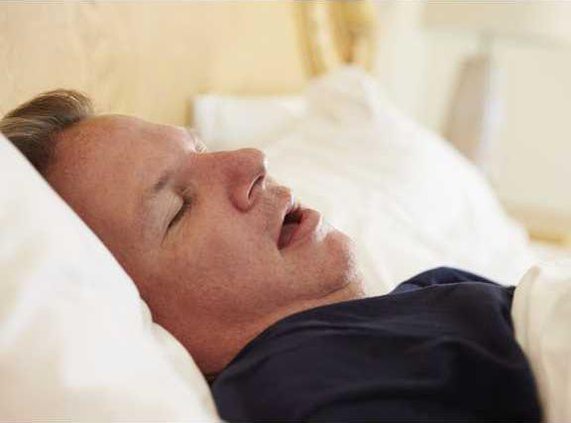Chronic snorers might need to put aside their Breathe Right strips and schedule a doctor's appointment. Several recent articles and a new research study have highlighted health risks associated with snoring that often go unacknowledged.
"The big concern: obstructive sleep apnea, a condition in which blocked airways cause people to stop breathing many times a night, disrupting sleep and cutting off oxygen to the body and brain," USA Today reported. "Untreated apnea can lead to high blood pressure, heart attack, stroke, obesity and diabetes and the sleepiness it causes can contribute to accidents at work and on the road."
Sleep apnea was also linked recently with dementia, because disrupted breathing has a negative impact on the brain, Time reported.
The study, published in the journal Neurology (paywall), found that people experiencing "sleep-disordered breathing" experienced cognitive decline earlier than people who sleep without making a peep.
Of the 2,000 people enrolled in the study, "those who reported having sleep apnea or snoring tended to develop signs of mild cognitive impairment, including memory lapses and slower speed on cognitive skills, about 12 years earlier than those who didn't report any sleep-disorder breathing," Time noted.
According to the Mayo Clinic, "as many as half of adults snore sometimes." Snoring's ubiquity is one reason why its association with serious health conditions is surprising, USA Today reported. Most people just think of it as a nuisance.
But even occasional snoring should be discussed with a doctor, said sleep medicine specialist Shalini Paruthi to USA Today. Medical professionals can schedule a sleep study and investigate whether the snorer is just noisy or suffers from a more serious condition.
"You should expect the doctor to take a full medical history, ask about the nature of your snoring including whether a bed partner ever hears you gasping for breath and ask about daytime sleepiness," Paruthi said.
Sleep apnea requires treatment with a CPAP machine or surgery, but solving regular snoring could be as simple as adjusting sleeping positions, losing weight or avoiding certain activities before bed, according to the Mayo Clinic.
"The big concern: obstructive sleep apnea, a condition in which blocked airways cause people to stop breathing many times a night, disrupting sleep and cutting off oxygen to the body and brain," USA Today reported. "Untreated apnea can lead to high blood pressure, heart attack, stroke, obesity and diabetes and the sleepiness it causes can contribute to accidents at work and on the road."
Sleep apnea was also linked recently with dementia, because disrupted breathing has a negative impact on the brain, Time reported.
The study, published in the journal Neurology (paywall), found that people experiencing "sleep-disordered breathing" experienced cognitive decline earlier than people who sleep without making a peep.
Of the 2,000 people enrolled in the study, "those who reported having sleep apnea or snoring tended to develop signs of mild cognitive impairment, including memory lapses and slower speed on cognitive skills, about 12 years earlier than those who didn't report any sleep-disorder breathing," Time noted.
According to the Mayo Clinic, "as many as half of adults snore sometimes." Snoring's ubiquity is one reason why its association with serious health conditions is surprising, USA Today reported. Most people just think of it as a nuisance.
But even occasional snoring should be discussed with a doctor, said sleep medicine specialist Shalini Paruthi to USA Today. Medical professionals can schedule a sleep study and investigate whether the snorer is just noisy or suffers from a more serious condition.
"You should expect the doctor to take a full medical history, ask about the nature of your snoring including whether a bed partner ever hears you gasping for breath and ask about daytime sleepiness," Paruthi said.
Sleep apnea requires treatment with a CPAP machine or surgery, but solving regular snoring could be as simple as adjusting sleeping positions, losing weight or avoiding certain activities before bed, according to the Mayo Clinic.

